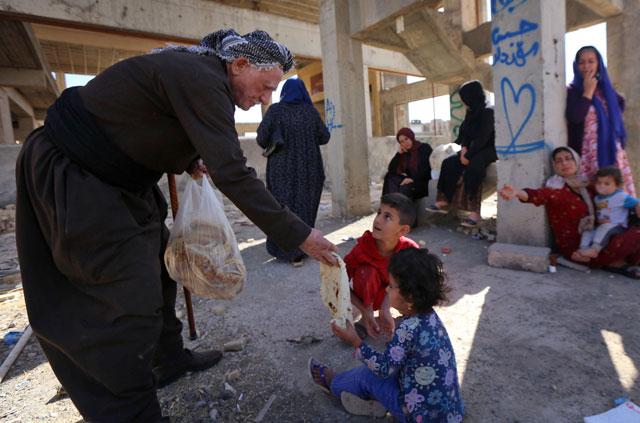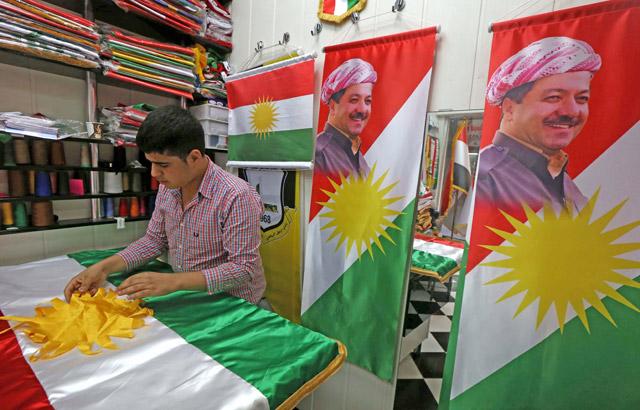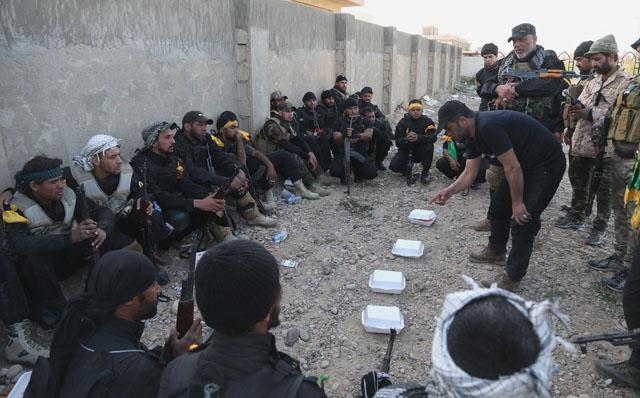You are here
Iraq's displaced find little comfort in Kurdistan, as Europe beckons
By Reuters - Oct 20,2015 - Last updated at Oct 20,2015
ERBIL, Iraq — When a mob attacked Abu Jasin on the streets of Erbil in northern Iraq, he feared he would never be safe in the country, not even in Kurdistan where he fled to, hoping to evade danger.
Jasin says he was targeted for being a Sunni, amid mounting Kurdish animosity towards Sunni Arabs suspected of being spies and sympathisers of the Daesh terror group.
The extremist group declared its cross-border “caliphate” in eastern Syria and western Iraq in 2014.
Its campaign to seize territory has sent tens of thousands of people like Jasin, and others from ethnic minorities, fleeing to the capital of Iraq's autonomous Kurdistan region which has managed to escape the worst of the violence plaguing other parts of the country.
But conflict, political unrest and a lack of economic opportunities in the area, defended by local peshmerga security forces battling Daesh militants, has left thousands of Iraqis desperate to leave.
"I need to give my two sons a better future, and here, there is no future. Our only hope is to reach Europe," Jasin told the Thomson Reuters Foundation in his home on the outskirts of Erbil, a bustling city that is changing shape with the construction of high rise buildings.
His dream is to go to Germany where his older son, who is 17, could go to medical school and become an X-ray technician.
"I am ready to do anything. It doesn't matter for me anymore," said Jasin, who holds an engineering degree from Baghdad University.
Like many Iraqis in Erbil, Jasin has been displaced before. In 2005, he fled to neighbouring Syria after being kidnapped and tortured by the Mehdi Army, a Shiite paramilitary group, over a business partner's alleged links with Saddam Hussein's family.
When war broke out in Syria, Jasin and his family returned to Baghdad before deciding Erbil would be a safer option.
Europe’s appeal
At least 50,000 Iraqis have left the country between July and September, according to Lise Grande, the United Nations Humanitarian Coordinator in Iraq, although other aid officials say the number could be much higher.
More than 3.5 million Iraqis have been uprooted from their homes and are displaced in the country. Few have any hope the war against Daesh will be over soon.
More aid would encourage them to stay, Grande said.
"If we are able to provide basic assistance to Iraqi families, they will think twice about their options; if we can provide education for their children and the opportunity to earn a living, we will have created a viable alternative to the dangerous journey they are now contemplating," Grande said in a statement last month.
Many Iraqis are inspired by others, including relatives, who have made it to Europe.
"The success of 'pioneers' reaching Europe, and availability of information via social media and other websites all demonstrate the feasibility of a trip to Europe," said Sandra Black, a spokeswoman for the International Organisation for Migration.
"I have heard that Iraqis in Europe encourage family and friends to join them, saying to come now because restrictions are currently more lenient," she told the Thomson Reuters Foundation.
Thousands of Iraqis have contacted smugglers and paid at least $6,500 per person to get to Europe, according to aid workers and would-be migrants.
They map out a well-established route, crossing into Turkey from Zakho in northern Iraq. Once inside the country, many Iraqi migrants head west to Izmir on Turkey's Aegean coast, where they board boats headed for Greece.
Khalil Ibrahim Rabee is another Sunni who is determined to leave. Originally from Baqoubah, about 70km north of Baghdad, the 43-year old lives in Erbil with his wife.
"It's tough to be a Sunni these days. People look at you badly and there is a lot of prejudice. They think we are terrorists," he told the Thomson Reuters Foundation.
Last year, Rabee was kidnapped by Shiite militia who only released him after his family paid a $30,000 ransom.
"When I disappeared my wife collapsed. We found each other back in the hospital. I was also in very bad shape," he said.
Despite being forced to sell his truck to cover a series of medical bills, Rabee still hopes to rustle up the money to get out of Iraq.
"We are becoming old, this is our last shot to have a decent life far away from Iraq," he added.
Disappearing culture
The younger generation are perhaps the most eager to leave.
Zeith, a university student, who asked not to be identified for security reasons, is planning the trip. He fled from Baghdad to Kurdistan, hoping to reach his older brother in Britain.
"My best friend died few months ago. He was shot on the street for no reasons," he said. "Nowhere is safe in Iraq and most of the people I know are either gone or in the process of going."
Sunni Arabs are not the only ones trying to reach Europe.
Father Gabriel Tooma, a priest who lives in Al Qosh, in the northern province of Nineveh, a former Christian area now controlled by Daesh believes tens of thousands of people have left Iraq in the past few years.
"We are a religious minority and there is no place to go here," Tooma said, resentful of Daesh’s persecution of Christians and other minorities.
"Our culture will disappear if nobody stays behind," he said, but adding that he did not want to convince families to risk their lives by staying.
But not everybody wants to leave.
One Iraqi who is staying put is Raid Micheal, a 42-year old from Baghdad, who is employed by the Italian aid agency, Un Ponte Per, in Erbil.
"If everybody leaves, there will be nobody to reconstruct the country once the war is over. And this is our country we can't give it to somebody else," he said.
Related Articles
ERBIL, Iraq/BAGHDAD — About 100,000 Kurds have fled the Kirkuk region for fear of persecution since Iraqi armed forces retook disputed terri
ERBIL, Iraq — Iraq's autonomous Kurdish region on Wednesday announced it would hold a referendum on independence, in a move the central gove
Iraq has not requested air support from the US-led coalition for its campaign to retake Tikrit from Daesh insurgents, a senior military official in the coalition said on Thursday, as the assault on the city remained on pause for nearly a week.

















